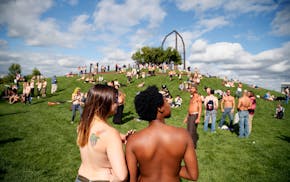Opinion editor's note: Strib Voices publishes a mix of guest commentaries online and in print each day. To contribute, click here.
•••
A young friend had invited me to go with him to the Pittsburgh Gun Show. It's a culture I don't know at all — I've never even shot a gun — so I went along. There were a lot of guns, and a lot of other things too, like old Army uniforms, but mostly guns, gun parts and ammo. And knives.
The people there really, really like guns. As I say, it's not my world, so I asked some people at my local place, a townie dive bar in the northern part of the county, what they think about guns.
The pleasures of guns
Not everyone I talked to has a gun now, but almost everyone grew up with them in the house, because their family went hunting. Several talked about the pleasures of the thing itself, the way guns work and the ways they've developed over time, the kinds of features that interest any collector.
"My version of quarters and stamps is collecting different cool guns," Sean said. "I have my passions; you have yours." Now a criminal justice major at Pitt, he was the most experienced person I talked to, having spent three years in the infantry, part of the time as the company armorer, and being an NRA-certified instructor. He has several guns, mostly older, going back to an 1873 Colt revolver.
"It's like tattoos. You can't get just one," said Greg, a computer programmer, and laughed.
Everyone mentioned the pleasures of target shooting. They saw gun ownership as a communal activity. Greg talked calling shooting at a range with friends a "thrilling recreation."
It's also "therapeutic" for Sean. "I can zone out and focus on nothing but my rifle and the paper in front of me." Others talked about enjoying the competition in getting better at target practice. It's a game they enjoy.
Sean also had guns for self-defense, though he said, fervently, that he hoped he never had to use a gun on a living person. Everyone mentioned self-defense, but in a just in case way, not a living in fear way.
Greg's wife Julia, who works in sales for a software company, was the most straightforwardly liberal of the people I talked to. (The people I talked to split about 60 — 40% conservative/liberal.) They had decided to get a gun after seeing a news story about a mass shooting and finding at the end that it was the fifth mass shooting that month. They talked about it for a long time.
Julia was especially hesitant. She still didn't seem to like the idea. "You should never not feel the weight of touching a gun, of having a gun around," she said. She wanted more training for gun owners and more attention given to people who are "red flags."
Self-defense and regulation
"It's the old saying," said Kelly, a bartender at another establishment. "Guns don't kill people. People kill people. You could put a gun on the bar right now, it's not going to go off by itself." The problem is with society. When I asked what she thinks went wrong with society, she answered, "I have no clue."
Everyone criticized gun-nut weirdos. "To me, it's a red flag when someone makes gun ownership part of their personality," Tony said. Tony, who works as a skilled manufacturer, pointed to people who "open-carry into Walmart" and called that "virtue-signaling in a weird way." Having a lot of guns "is a way to assert oneself in a world they feel is hostile" and that's a red flag.
Like Kelly, he thought the real cause was social. Many people saw other people as "NPCs," the "non-player characters" in video games whose lives mean nothing. And like Kelly (and me), he had no clear answer to changing people.
Greg had changed his mind about guns when "being out of the idealist college years," he learned that "outlawing guns won't keep a bad guy from having a gun. It's hard to say, but sometimes the only thing that will stop a bad guy with a gun is a good guy with a gun." He wanted psychological evaluations for anyone who wants to buy a gun, but assumed that won't happen.
Everyone wanted guns to be regulated and several spoke of "common sense rules," like more extensive background checks and stricter red flag laws. They were divided between people who believed that guns were a normal part of life to which they had a right and others who might agree with that but emphasized the impossibility of effective gun control. As a whole, they hold conservative views on gun ownership and centrist to fairly liberal views on gun regulation.
Different reactions
I think I saw one big difference that affects the ways Americans discuss guns: My peers at the bar don't react to guns the way those of us who didn't grow up with them often do. The issue has a different emotional weight for both groups, which have very different senses of the way this one issue relates to the rest of life.
They feel comfortable with them, as a normal part of life. Guns are tools like axes or recreations like drones, dangerous things that can be misused, but that have other purposes and can't be eliminated just because some people misuse them.
For others of us, guns feel more like threats, like arsenic or something radioactive. (I did not like even touching the gun the one time I had to hold one.) They're not a normal part of life. The danger feels much more urgent and the uses much less important.
It's hard to talk across that difference.

Olson's Cheers & Jeers: Where leadership is and isn't

